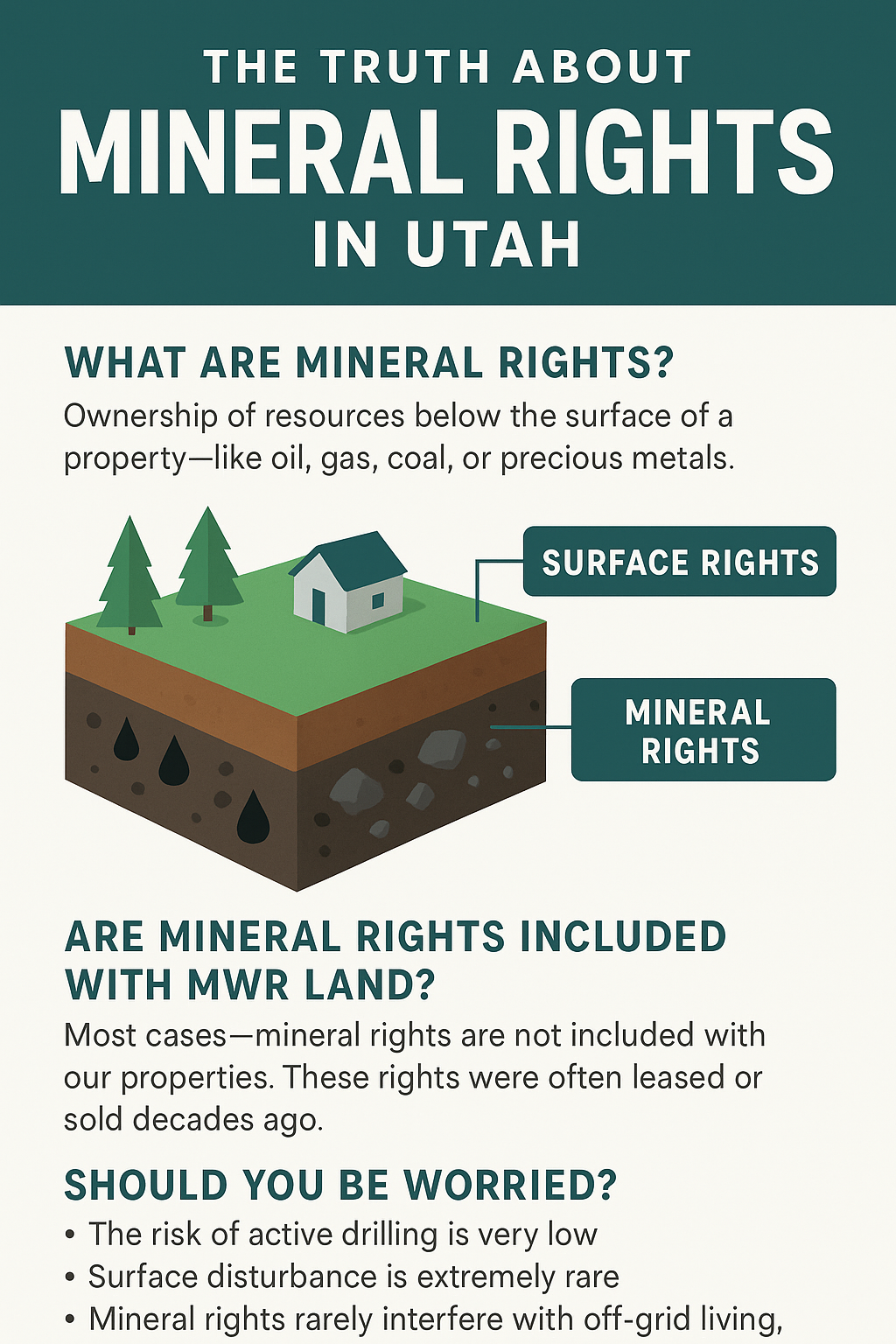The Truth About Mineral Rights in Utah
When you're buying land in Utah, it’s natural to wonder what lies beneath the surface. Do you own the minerals under your land? Can someone else extract them? These questions matter—especially in areas like Duchesne and Fruitland, where oil, gas, and other resources can be part of the landscape.
What Are Mineral Rights?
Mineral rights refer to the ownership of resources found below the surface of a property—like oil, gas, coal, or precious metals. In Utah, surface rights and mineral rights are often severed, meaning one person might own the land, but someone else owns the minerals beneath it.
Surface Rights vs. Mineral Rights
Owning land doesn’t always mean you control what’s underground.
Surface rights give you the ability to use the land for recreation, building, agriculture, or investment.
Mineral rights give the holder the legal ability to explore and extract underground resources.
When buying rural land, it's important to ask whether mineral rights are included in the sale.
Are Mineral Rights Included with MWR Land?
In most cases, mineral rights are not included with our properties—but that’s the standard across Utah and many western states. These rights were often leased or sold decades ago, and they rarely affect our buyers.
If mineral rights were previously sold, a company could technically have the right to access them—but this is extremely rare for recreational or rural lots like ours. You can always contact the county recorder for mineral rights history if you’re concerned.
Should You Be Worried?
For the vast majority of our land buyers, mineral rights aren’t a concern. Here’s why:
The risk of active drilling is very low on small rural parcels.
Surface disturbance is extremely rare and would still require legal notification and permitting.
Mineral rights owners typically negotiate with large landowners, not small lot holders.
If your goal is off-grid living, recreation, or future building, mineral rights rarely interfere.
Learn More About Buying Land in Utah
If you're thinking about buying land in Duchesne or Fruitland, we're here to help you understand every part of the process—from water access to financing to zoning. You can also read our guide on off-grid Utah land to learn how to get started.
What Is a Land Patent and Do You Need One in Utah?
If you’ve been researching land ownership, you may have heard of a “land patent.” While the term sounds official and important, many buyers are unsure what it really means—or whether it impacts their Utah land purchase.
What Is a Land Patent?
A land patent is the original transfer of land from the U.S. government to a private individual. Most land in the western U.S., including Utah, began this way—granted to settlers, railroads, or other private parties as part of public land programs.
Today, these patents serve as a historical record. Your deed or title traces back to that original patent.
Land Patent vs. Land Title
A land patent shows the first ownership transfer from the government.
A land title or warranty deed shows legal current ownership of the property.
When you buy land from Mountains West Ranches, you’re getting a clean, recorded deed backed by decades of ownership records. You do not need to request or file a land patent—everything is already covered through your title and public recording.
Do You Need a Land Patent to Prove Ownership?
No. In Utah, your recorded deed and title insurance (if applicable) provide full proof of ownership. Trying to “reclaim” or re-file a land patent is unnecessary and can even complicate your ownership.
Some people promote land patents as a way to protect against government action or taxes—but these claims are not legally supported. The best protection for your property is a clear title, zoning awareness, and accurate county records.
Focus on What Matters: Verified Ownership and Easy Terms
At Mountains West Ranches, all land we sell includes a clean deed and full ownership. Whether you're interested in financing options with no credit checks or learning about zoning rules for camping or building, we make buying land simple and transparent.
Want to learn more? Reach out to our team or check out our current land listings.

